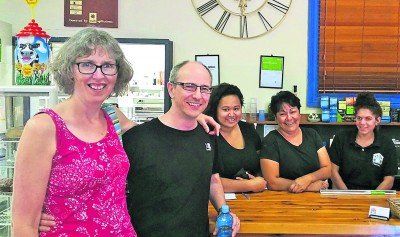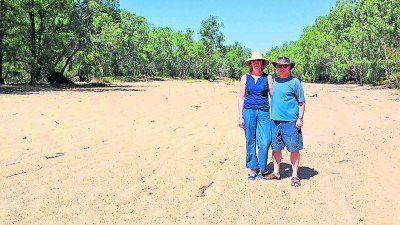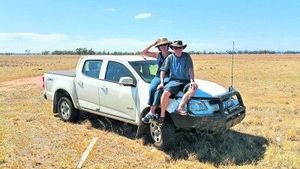It took a few attempts before I could get the hang of pronouncing ‘Gulargambone’ correctly. The name means ‘place of Galahs’ or ‘watering place of many birds’, in the language of the local indigenous people. Gulargambone is a small community of about 400 people located more than 500km north-west of Sydney, in New South Wales, Australia. Galahs are grey- and rose-coloured cockatoos found in large numbers in the area.
Our journey to Gulargambone began in Sydney with a train ride of nearly seven hours, winding our way up through the Blue Mountains to the west of the city and heading off towards the western plains.
The scenery was beautiful, with green hills, red crags, deep gorges and traditional small towns. At times, the train seemed to barely be moving at more than walking pace, such was the steepness of the incline and tightness of the bends.
Once we were over the mountains, the landscape changed, as gradually the hills flattened out, and it became more rolling and open bush, with scattered farms and small communities and occasional glimpses of kangaroos hopping through the fields.
End of the line
The end of the line was Dubbo, a town of about 40,000 residents, from where we travelled about 100km north, by 4wd vehicle, to Gulargambone.
Many in the UK will have heard of Moore College in Sydney and of the strength of evangelical Anglicanism in that city and its influences further afield; or perhaps have friends or family in Australia, who are members of congregations belonging to Presbyterian or other churches with solid biblical ministries.
But there is a world within Australian Christian life that is, I suspect, largely unknown to most of us in our corner of the globe. The reason for making the journey to Gulargambone was to see at first hand something of this other world.
We were there to visit the Field Director of Australian Indigenous Ministries (AIM), Stephen Bignall, whose home is in this small community, in the open countryside towards the edge of the outback.
AIM is a mission which seeks to evangelise Aboriginal people and supports workers and church planters in many, often remote, places in this vast country. The Gaius Trust is a charity that aims to raise awareness, encourage prayerfulness, and facilitate financial support for gospel mission among indigenous peoples. At present, the focus is on supporting Stephen and his wife, Fiona, in their ministry.

Social problems
Sadly, there are tremendous social problems within Aboriginal communities. Alcoholism, drug abuse and other addictions have blighted many lives. Broken and abusive family backgrounds are not unusual, and young people can easily feel a sense of hopelessness.
There can be suspicion and hostility between Aboriginals from different tribal groups. Poverty and all sorts of health problems are common, with the life-expectancy of Aboriginal people being significantly less than that of, say, those of ethnic European roots living in Australia.
Historically, and down through the generations, Aboriginals have suffered discrimination and persecution at the hands of some settlers and their descendants. In more recent times, there have been conscious efforts to seek to redress the injustices.
However, there is resentment, as well at what is seen as a squandering of resources on people who simply waste them. This of course is a caricature, because what some may do does not characterise what all do.
Above all else, the greatest need of Aboriginal people is to hear the gospel of Jesus Christ. Today, the secular world tends to romanticise indigenous cultures, and the idea of Christians seeking to ‘evangelise and convert people to another religion’ is seen as inimical to their needs. But the Aboriginal religion is animistic, its practices spiritually and morally harmful; and so are some aspects of the culture that attends this religious background.
That is not the same as saying that Aboriginal culture in its entirety is wrong, but it is to say that they, like all people, do need to hear the gospel, because they are sinners whose only possible hope is Jesus Christ.
Christians have sought to take the gospel to Aboriginals for a long time. There have been many faithful men and women prepared to cross social and cultural divides to evangelise these ancient, traditional communities, as well as provide practical help.
Aboriginal believers
Today, by God’s grace, there are Aboriginal believers, churches and leaders. In Western Australia, the Aboriginal Evangelical Fellowship has its own Bible college, located near to Perth.
They are seeking to train Aboriginal people for ministry among their own people. AIM supports both indigenous and non-indigenous men in pastoral ministry; and some congregations are happily mixed, bringing together believers from different ethnic backgrounds.
In other places, churches will be very much Aboriginal. Some of these groups of believers are in incredibly isolated locations in this massive country.

The Australian education system retains its Christian-influenced ethos, established in the early decades of the nation’s formation during the nineteenth century. Today, people such as Stephen and Fiona Bignall can give lessons in schools, teaching not ‘religion’, nor even merely ‘about’ Christianity, but teaching children what the Bible actually says and about Jesus Christ as the Saviour of sinners. This crucial ministry to children and young people could be sowing the seeds for future blessing within Aboriginal and other communities.
The logistics of mission support, and the opportunity for fellowship with other groups of believers — attending conferences, and many things we can easily take for granted in the UK — are rendered difficult by the vastness of the country.
Overlooked priority
All-in-all, this is a challenging mission field, much in need of the prayerful and practical support of the Lord’s people.
It may seem strange that the UK-based Gaius Trust would be seeking to raise financial support for missionaries reaching out to Aboriginal people in Australia. One can understand the need for prayerful support, but doesn’t wealthy Australia have sufficient resources within its own churches?
To be frank, it must do. Yet it also has the sort of blindness that we can all suffer from, which causes us to overlook mission on our own doorstep. In a similar way, mission in Europe has not generally been viewed by UK churches with the same urgency as mission in Africa, Asia or South America.
The same problem appears to be true among churches in Australia, where mission on their own doorstep has lacked priority. There is a vision for mission though which is truly global, and, in this case, concerns the spreading of the good news of Jesus Christ among the Aboriginal people of Australia. There is a part to play for Christians both in Australia and the UK.
For more information contact the Gaius Trust (office@gaiustrust.org.uk); or visit: www.gaiustrust.wordpress.com or www.australianindigenousministries.org.au
Martin Leech is director of European Missionary Fellowship (EMF) and a trustee of the Gaius Trust







